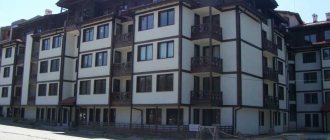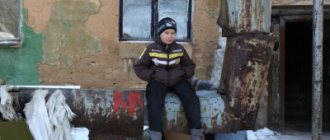The privatization program in Russia has been in effect for more than fifteen years. During this period, more than half of the public housing stock became the property of citizens. But not every building can be privatized. This issue especially worries people whose housing is in disrepair. Let's consider whether privatization of such real estate is possible.
The legislative framework
The question of whether it is possible to privatize a building in disrepair should only be resolved using the appropriate legislative framework. The concept of privatization is explained by the Law of the Russian Federation No. 1541-1, dedicated to the privatization of the housing stock.
Article 4 of the same law states that it is impossible to privatize an apartment in a dilapidated building or any other building recognized as such.
Article 32 of the Housing Code states that the rights of the owner of residential real estate are ensured if the land plot is withdrawn for municipal or state needs.
Who has the right to become an owner
The owner of non-privatized emergency housing is the state. He is represented in this matter by local authorities or an authorized enterprise financed from the state budget.
Appropriating a dilapidated building can be quite simple, but with a dilapidated building it is somewhat more difficult. The owners of an apartment occupied under a social tenancy agreement can be permanently registered residents. But if the apartment is in disrepair, you should first wait for relocation, then conclude a rental agreement and submit documents for privatization. If a dilapidated house is demolished, you have the right to receive equivalent housing.
The responsible tenant and members of his family can occupy the apartment. All citizens included in a social tenancy agreement receive permanent registration. From this moment their rights to free privatization come into force.
The property is available to everyone registered in equal shares. This requires the consent of each registered resident. If there is one, each of them will have their own part of the living space in shared ownership.
One of the registered residents may refuse to privatize their share in favor of another person registered in the apartment. This fact is certified by a notary, and a person who refuses to privatize his share can still exercise the right to receive an apartment for free in the future.
About resettlement
When demolishing dilapidated and emergency housing, resettlement always occurs . Upon relocation, they receive equal housing.
In 2011, some amendments were made to the housing provision law. Based on these changes, home owners and tenants of living space have become equal in rights.
Before this, residents under a social lease agreement could count on a living space of 18 square meters. m. per registered person. However, at the moment they can only expect to receive an equivalent area. Owners of privatized housing are also entitled to the same share.
Thus, privatization of housing does not provide any additional privileges. Just as registration of a large number of citizens in one area does not give the right to expand new living space. The only difference between a privatized apartment during demolition is that the tenant can be paid compensation equal to the market value.
When demolition of emergency housing, the owners of municipal apartments are evicted , and the social rental agreement is terminated. In return, citizens receive another comfortable living space with the conclusion of a new social rental agreement (Article 86 of the Housing Code of the Russian Federation).
Article 86 of the RF Housing Code. The procedure for providing residential premises under a social tenancy agreement in connection with the demolition of a house
If the house in which the residential premises occupied under a social tenancy agreement is located is subject to demolition, the citizens evicted from it by the state authority or local government body that made the decision to demolish such a house are provided with other comfortable residential premises under social tenancy agreements.
Local government officials deal with questions about the size of the new living space provided. At the moment, this issue has not been resolved at the legislative level.
Therefore, everything depends on the specific case. In one situation, citizens who were on the waiting list for improvement can be provided with housing in accordance with the standards. In another situation, equivalent living space may be provided. Sometimes families can even get several separate apartments. It all depends on the region of residence and the policies of local governments.
Is it possible to privatize emergency housing?
Emergency housing is not subject to privatization. In addition, it is unlikely that it will be possible to privatize land if the house is in disrepair, since the advantage of obtaining ownership belongs first to the residential property, then to the land on which it is located.
When a conclusion about the emergency condition of the property has already been received, residents must submit an application to local authorities to participate in the relocation program. Everyone registered in an emergency apartment will be provided with housing - not separate, but with the same number of square meters and mainly in the same area.
Privatized housing in a dilapidated building
Advice from lawyers:
1. Is it possible not to privatize housing? The house is old, semi-dilapidated. I'm a pensioner.
1.1. Can. It is your right.
Did the answer help you?YesNo
Consultation on your issue
8
Calls from landlines and mobiles are free throughout Russia
2. So, is it possible to immediately privatize housing after moving out of a dilapidated building?
2.1. If housing is provided under a social tenancy agreement, it can be privatized immediately.
Did the answer help you?YesNo
2.2. Hello! Yes, it is quite possible to privatize housing after resettlement.
Did the answer help you?YesNo
2.3. You can't do it right away. You must first conclude a social tenancy agreement.
Did the answer help you?YesNo
3. Our house is considered unsafe. Can I privatize my home?
3.1. Hello! NO, in emergency - privatization is prohibited. GOOD LUCK TO YOU.
Did the answer help you?YesNo
3.2. Hello, Alina. It cannot be privatized. In accordance with Article 4 of the Law of the Russian Federation “On the privatization of housing stock in the Russian Federation”, residential premises in disrepair, in dormitories, in houses of closed military camps, as well as service residential premises, with the exception of the housing stock of state farms and other agricultural enterprises, to them equal, and the housing stock of stationary institutions for social protection of the population located in rural areas.
Did the answer help you?YesNo
4. 1.What can I claim as the owner of a share in emergency housing? 2. how to privatize the land under a dilapidated house (5 apartments)?
4.1. Hello Svetlana! You can apply for payment of compensation or for the provision of housing on social rent (you need to know more about the date of purchase, the date the house was declared unsafe, etc., inclusion in the program). The land plot under the MKD passes free of charge into the ownership of the owners of the premises in the MKD, if it is formed, because put on caducerate. You can register your ownership.
Did the answer help you?YesNo
4.2. Hello Svetlana! You have the right to 1. Compensation 2. Relocation 3. Improvement of housing conditions if you are recognized as needy or low-income. As for land, according to the amended legislation you will not be given any additional compensation for land, so most likely there is no point in privatization. Sign up for a consultation with us, we specialize in relocating emergency housing.
Did the answer help you?YesNo
5. Our apartment was privatized in the name of me and my son, a certificate was issued on May 15, 2006. The son is an adult. We want to sell it, what tax will be charged, an apartment worth up to 1 million rubles. Will this housing be considered the only one? We have 2 plots of land for individual housing construction, on one the house burned down, the other is for demolition because it is in disrepair. The plots are registered in my name.
5.1. Since you have owned the apartment for more than 3 years, income from the sale of the apartment will be exempt from personal income tax. Article 217.1 of the Tax Code of the Russian Federation. Features of exemption from taxation of income from the sale of real estate objects 2. Unless otherwise established by this article, income received by a taxpayer from the sale of a real estate object are exempt from taxation provided that such an object was owned by the taxpayer for the minimum maximum period of ownership of the real estate object property and more. 3. For the purposes of this article, the minimum maximum period of ownership of a real estate object is three years for real estate objects in respect of which at least one of the following conditions is met: 2) ownership of the real estate object was received by the taxpayer as a result of privatization;
Did the answer help you?YesNo
6. The administration of the city of Pushkino Moscow region demands the demolition of an apartment building at the expense of the homeowners, the house is recognized as unsafe and subject to resettlement, instead of the privatized room 15.4 KVM, they first offered studio 27 KVM, I did not write a refusal, 5 people are registered in the room, two of whose young children are 3.5 years and 11 months old.
6.1. 1. Demolition must be done at the expense of the Administration (apply to the Prosecutor's Office) 2. Instead of 15.4 sq. m. they offered 27 meters and this is normal if you are not recognized as poor and needy (if you did not apply). This does not happen automatically!. You do not indicate the number of owners. Registered citizens and owners do not have equal rights. You need to understand this. 3. Their parents are responsible for their children and they must take care of providing a place of residence for them. Not enough information.
Did the answer help you?YesNo
7. Our house was built in 1938. Removed from balance in 2000. Previously there was a 4-apartment, now there is a 2-apartment. The apartments have been privatized. The administration does not issue resettlement orders and does not create a commission to recognize housing as dilapidated or in disrepair. What should I do?
7.1. In general, if you contacted the administration regarding the issue of recognizing your house as unsafe, then the administration is obliged to create an interdepartmental commission. If it does not create one, then on the basis of Article 10 of the Federal Law on the Prosecutor's Office of the Russian Federation, contact the prosecutor's office.
Did the answer help you?YesNo
7.2. Appeal the administration's inaction to court.
Did the answer help you?YesNo
7.3. Hello, What do you mean removed from balance? On what basis? If the house is in disrepair, take the initiative yourself, write complaints and demand that the house be recognized as disrepair. I wish you good luck and all the best!
Did the answer help you?YesNo
8. Many sources indicate that dilapidated housing cannot be privatized, but the legislation on housing privatization states that DAMAGED HOUSING cannot be privatized. So is it possible or not to privatize dilapidated housing? The house has been on the resettlement list for a long time, BUT it is not recognized as EMERGENCY.
8.1. Hello, It is up to the owner of the property, represented by the state, to decide what to transfer into the ownership of citizens for free and what not. I wish you good luck and all the best!
Did the answer help you?YesNo
9. My house has been declared unsafe, but is not yet in the queue for demolition. They provide me with an apartment in a flexible fund. As far as I understand, I won’t be able to privatize? And the administration can review the status of this apartment and provide it to me for social rent, so as not to have to move if/when my emergency housing is demolished.
9.1. As a rule, a flexible fund is provided only for temporary residence. And it is not subject to privatization. It will take longer for the administration to decide.
Did the answer help you?YesNo
10. My three children and I are registered with my mother in a dormitory room of 12 m. The room is privatized for my mother. Where should I register and live with my children? We don't have our own housing. Can we be given housing in a flexible fund?
10.1. You can get on the waiting list as those in need of improved living conditions.
Did the answer help you?YesNo
11. My three children and I are registered with my mother in a dormitory room of 12 m. The room is privatized for my mother. Where should I register and live with my children? We don't have our own housing. Can we be given housing in a flexible fund?
11.1. Why do you write the same question 2 times?
Did the answer help you?YesNo
12. The house is recognized as unsafe, it is in the register, there is a demolition date. The apartment is decorated according to social I'll hire. Should it be privatized or left as is? Will there be an opportunity to privatize new housing later?
12.1. Good afternoon, Stanislav! A dilapidated house cannot be privatized due to a direct prohibition by law. So, according to para. 1, Article 4 of the Federal Law "On the privatization of the Housing Stock in the Russian Federation" Residential premises in disrepair, in dormitories, in houses of closed military camps, as well as service residential premises, with the exception of the housing stock of state farms and other agricultural enterprises, are not subject to privatization. equivalent to them, and the housing stock of stationary institutions for social protection of the population located in rural areas. However, after they give you new housing after resettlement, you can privatize the new one and conclude a social tenancy agreement with you for a new apartment.
Did the answer help you?YesNo
13. The apartment building is recognized as unsafe and subject to demolition. My apartment is not privatized. Will they resettle me, or may they leave me homeless?
13.1. Hello! Conclude a social rental agreement (for tenants) or an agreement on the seizure of real estate for state or municipal needs (for apartment owners.) If an apartment building is not included in the regional targeted program for the resettlement of citizens from emergency housing stock, then the citizen has the right to expect only compensation for the seized living space. At the same time, state authorities or local governments are not obliged to provide the owner of the seized residential premises with other residential premises. In this case, another residential premises instead of the seized one can be provided to the owner only if there is an appropriate agreement reached with the local government body, and only with the offset of its value when determining the amount of compensation for the seized residential premises (Part 8 of Article 32 of the Housing Code of the Russian Federation; clause 20 Resolution of the Plenum of the Supreme Court of the Russian Federation dated July 2, 2009 N 14; Section 2 of the Review of Judicial Practice). 2.2. If an apartment building is included in a regional targeted program for the relocation of citizens from emergency housing stock, then it has the right to count on the provision of another residential premises or compensation for the seized residential premises. The choice of any of the above methods remains with the owner of the residential premises (clause 3, article 2, article 16 of the Law of July 21, 2007 N 185-FZ; section 2 of the Review of Judicial Practice).
Did the answer help you?YesNo
Consultation on your issue
8
Calls from landlines and mobiles are free throughout Russia
14. A privatized house may fall under the dilapidated housing program; the house is not worthy; in disrepair, the owner is not registered, but pays the tax.
14.1. Formulate the question!
Did the answer help you?YesNo
15. A wooden 16 sq. house due to arson, including my own apartment. The house was declared unsafe and subject to resettlement. My disabled mother, 80 years old, and my middle son are registered there. They have no other housing. I am a pensioner, I live and am registered in another privatized apartment with a total area of 40 square meters. With two adult sons. Which of us should contact and where? Is it possible for relatives to get housing? Is it necessary and possible to obtain the purchase price for housing?
15.1. Hello Elena Accordingly, the owners of a burnt house can contact the local government for support and housing.
Did the answer help you?YesNo
15.2. The owners must be paid monetary compensation.
Did the answer help you?YesNo
16. Our grandmother is 90 years old. She lives in the village, she had a house called Barak, it had 3 rooms. Apartment, there was a fire on the 2nd floor and the culprit burned down. She was left homeless. The apartment has been privatized. But since Barak was already in disrepair and unfit for habitation after the expiration of its service life. They turned to the head of the village for help, he said that they could only rent housing. Is it possible to somehow get housing or compensation or not?
16.1. If the culprit has heirs, then you can try. From the municipality to social media hiring
Did the answer help you?YesNo
17. The house has an HOA, my apartment is not privatized, the cold water riser is in disrepair. The chairman is aware and has a written request for a replacement. But he refuses to change the riser, saying that the rent debtor is changing it at his own expense. There is not much for the position. What to do?
17.1. Good afternoon File a complaint regarding this fact with the housing inspectorate or the city prosecutor's office. In accordance with clause 5 of the Decree of the Government of the Russian Federation dated August 13, 2006 N 491, in-house engineering systems for cold and hot water supply
, consisting of risers, branches from the risers to the first disconnecting device located on the branches from the risers, said disconnecting devices. In accordance with clause 10 of the Decree of the Government of the Russian Federation of August 13, 2006 N 491, common property must be maintained in accordance with the requirements of the legislation of the Russian Federation, in a condition that ensures compliance with the reliability and safety characteristics of an apartment building; safety for the life and health of citizens, safety of property of individuals and legal entities, state, municipal and other property. The fact that you have a debt for housing and communal services does not in any way cancel the obligation to fulfill the requirements of the law regarding the proper maintenance of common property. .
Did the answer help you?YesNo
17.2. Olga, write a written request to the HOA to replace the riser and demand a refusal in writing with reference to the law. After that, if they refuse, demand a replacement of the riser through the court. It will be faster.
Did the answer help you?YesNo
18. My son and I live in a 20.2 square meter privatized apartment, in a dilapidated building. He and I are also on the waiting list for improved housing conditions as low-income people. This turns out to be 2 turns. Tell me, according to the law, when moving from emergency housing, we can be provided with an apartment with the missing meters, that is, make up for 2 stages in 1 stage? If there is such a law? What should I do to ensure that our rights are not violated?
18.1. Yes, you can be given an apartment with missing square meters.
Did the answer help you?YesNo
18.2. Hello. In any case, do not refuse what they offer. Either they will immediately provide an apartment with increased living space, or first relocation from an emergency one, then there will be an increase. And you don’t need to go anywhere yet; lawyers won’t speed up this process. So that you are not forgotten, write an appeal to the prosecutor’s office yourself, to tone up the administration. Good luck to you.
Did the answer help you?YesNo
19. My son and I live in a 20.2 square meter privatized apartment, in a dilapidated building. He and I are also on the waiting list for improved housing conditions as low-income people. This turns out to be 2 turns. Tell me, according to the law, when moving from emergency housing, we can be provided with an apartment with the missing meters, that is, make up for 2 stages in 1 stage? If there is such a law?
19.1. Hello Tatiana. Your first priority is to improve your living conditions. If a house is declared unsafe, they do not put it on a waiting list, but set a deadline for moving the house. Since your family is in line for improved housing conditions, provided that upon resettlement you are not paid the redemption price (Article 32 of the RF Housing Code), you must be provided with other housing, taking into account additional square meters (Article 89 of the RF Housing Code). For example, if you have an apartment with a total area of 30 sq.m., then according to Art. 2 of Resolution No. 824 “On approval of the accounting norm for the area of residential premises and the norm for providing the area of living premises, operating in the territory of the municipal formation “Ekaterinburg City”, instead of emergency housing, you must be given housing with a total area of at least 32 sq.m.
Did the answer help you?YesNo
20. We received an apartment for relocation from emergency housing in a new building and privatized it a couple of months later. We lived there for 2 years in the summer and replaced the bimetal batteries (there were 3-4 sections) in each room with cast iron ones, since it was cold at home and the children were constantly getting sick because of it. The housing complex demands that everything be returned within a month. Why should I freeze again now? What to do, please tell me.
20.1. This requirement is illegal.
Did the answer help you?YesNo
Relocation from emergency and dilapidated housing. In an apartment building (recognized as unsafe)
The husband is the owner of an apartment in a dilapidated building. He did not privatize the apartment, but bought it.
The question is... If we, seven families, get new housing because we currently live in a municipal, emergency building.
The question is... If we, seven families, get new housing because we currently live in a municipal, emergency building.
Parents bought 1/2 of the house with a mortgage, the status is apartment. The house is located on a plot of land that is divided in half.
They are going to move our house. Looks like we're on the trail. The year seems to have been recognized as an emergency...
Please tell me, we have an apartment in a 2-apartment building in the Pechora district, Ozerny village.
In a wooden two-apartment house, a family is registered in the apartment (husband, wife, married for 10 years).
My family and I: I, my wife and two children of different sexes, one of whom has been disabled since childhood, live in a communal apartment.
My husband and I are divorced, now I live and am registered in an apartment that is owned by my ex-husband (he privatized it,
The child is registered at the father’s place of residence and the apartment building is recognized as unsafe.
Privatization of dilapidated housing
If the commission has not made a conclusion about the unsafe condition of the building, it is possible to recognize its dilapidation. The acquisition of property in a dilapidated building is not limited by law.
A building is called dilapidated if it does not threaten the lives of those living in it, but the communication systems and supporting structures have worn out by more than half. The process of appropriating dilapidated housing in 2020 will be no different from the privatization of ordinary apartments.
But it should be understood that the Housing Code did not leave aside dilapidated buildings. Becoming the owner of a dilapidated home, the owner is obliged to maintain it. If the building is municipal, all responsibility for its maintenance rests solely on the shoulders of the state.
This is a good chance for those who want to get their own home. The chance of getting new square meters under the resettlement program is quite high. By privatizing space in a dilapidated house, in the future you can achieve its recognition as unsafe and resettlement.
How to privatize an apartment in dilapidated housing?
So, although the dilapidated building is not in the best operational condition, it is not in emergency condition, and therefore is subject to privatization. However, first it is necessary to confirm that living there does not pose a threat to life and health.
List of documents
The following documents must be prepared for housing privatization:
- civil passports of adult residents or other identification documents;
- birth certificate of children under 14 years of age;
- notarized powers of attorney from temporarily absent privatization participants;
- a valid social tenancy agreement;
- confirmation from the management office that there are no debts for utility services.
Attention! On our portal you can apply for the privatization of an apartment and for the refusal of privatization.
Application for privatization of an apartment
Order, algorithm
Considering the procedure, it should be noted that you can do without a trial. Especially if the residents agree to the privatization of dilapidated housing.
Privatization algorithm:
- Conduct a resident/family meeting.
- Write an application to the local administration or the Housing Department (Moscow).
- Interdepartmental examination stage.
- Drawing up an opinion on the condition of the house.
- Preparation of documents for privatization.
- Submitting a request to the local administration.
- Signing an agreement on the transfer of housing into private ownership.
- Drawing up a transfer and acceptance certificate.
- Payment of state duty.
- Registration of rights in the Unified State Register of Real Estate.
An apartment in a dilapidated building becomes the property of the residents. After this, they are responsible for maintaining the housing in a suitable condition.
Procedure
An important stage of the procedure is the examination. In order to order an examination, you need to contact government agencies. Municipal housing tenants can do this by submitting a collective application. In some cases, the initiator of the examination is the municipality itself.
The commission conducts an analysis of a residential building for:
- technical serviceability;
- sanitary and hygienic condition;
- compliance with fire safety standards;
- fire resistance;
- suitability for living in cold and hot seasons;
- other characteristics.
The application for an inspection is supplemented with a documentary basis. For example, an act of inspectors of the Main Directorate of the Ministry of Emergency Situations of Russia, representatives of the sanitary and epidemiological station, etc.
Documentation
The documents required for privatization do not differ much from the usual set.
Sample list of documentation:
- application for an examination of emergency/dilapidated housing;
- passports and certificates of privatization participants;
- extract from the house register;
- archival extract from the Unified State Register of Real Estate rights;
- a copy of the social tenancy agreement (or a warrant - if the building is already old);
- registration certificate of an apartment or house;
- notarized refusals from privatization (if residents do not want to participate in the transaction);
- permission from the guardianship authority (if children are involved);
- notarized power of attorney (if required);
- certificate of change of surname and other documents.
Pay special attention to the examination of a residential building. Before applying for privatization, you need to make sure that the building is not in disrepair - otherwise, you will be refused privatization.
Expenses
The cost of privatization of dilapidated housing coincides with the transfer of ownership of ordinary residential properties. The housing inspection is free - all costs are borne by the owner of the house represented by the municipality.
The main type of cost for residents is state duty. Now its amount is 2,000 rubles per person . Children under 14 years of age do not pay the state fee, because have another attempt to privatize the apartment.
Deadlines
When thinking about privatizing dilapidated housing, you should keep in mind the deadline for completing the documents:
- Ordering an interdepartmental examination – from 2 weeks .
- Carrying out the examination – from 15 days .
- Privatization of dilapidated housing – from 2 months .
- Making changes to Rosreestr – from 10 working days.
The total time to privatize dilapidated housing without trial is from 3 to 4 months.
Expenses
Privatization of an apartment is considered free and, as of 2020, indefinite. There is no need to rush anywhere anymore. However, as part of the procedure itself, certain expenses will still arise. Although they still cannot compare with the real cost of the apartment (even in a dilapidated building):
| Type of expenses | Amount of expenses |
| State duty for registration of property rights | 2000 rubles per tenant |
| Refusal to participate in privatization | Up to 1000 rubles |
| Extract from the Unified State Register of Real Estate | From 300 rubles |
| Extract from the house register | 200 rubles |
| Registration of a technical passport | From 1000 rubles |
If you use the services of a representative, you will additionally need to issue a power of attorney for him. This will cost about another 2-5 thousand rubles.
Example : Suppose a person wants to privatize an apartment. In addition to him, two more live in it, one of whom refuses to participate in privatization and draws up the corresponding document (1000 rubles). Now you need to collect documents: 1000 rubles - a registration certificate, 300 rubles - an extract from the Unified State Register, 200 rubles - an extract from the house register. Once everything has been agreed upon, ownership is formalized. Since out of 3 apartment residents only 2 are participating in the procedure, they must pay a state fee in the amount of 2 * 2000 = 4000 rubles. In total, the total amount of expenses was: 1000+1000+300+200+4000=6500 rubles.
Deadlines
From the start of the procedure until the registration of ownership rights, it usually takes 3-4 months. Of them:
- Up to 1 month to collect documents.
- Up to 2 months for processing the application.
- Up to 1 month registration of ownership.
Algorithm of actions
To recognize the emergency or dilapidated condition of housing, you need to obtain a commission opinion. The owner of the apartment contacts her - in the case of a social tenancy agreement, he is represented by the municipality.
Residents occupying an apartment under this agreement submit an application to the municipality. Then an assessment of the condition of the housing is carried out:
- state of technical systems;
- sanitary and hygienic standards;
- compliance with fire safety standards;
- sanitary and epidemiological requirements;
- possibility of providing utilities.
The application is supplemented by a package of documents. This may include the results of the fire service examination, but the required list includes the following papers:
- written statement from the residents of the house;
- copies of documents confirming legal residence in the apartment;
- conclusion of the interdepartmental commission.
Review of the application takes about a month. If the house is considered unsafe, the tenants will receive an eviction notice. After this, having received a new apartment, you can apply for privatization.
Questions and answers
Citizens living in emergency premises may have certain questions. Answers to some of them are given below.
If the house is being demolished
If a property has been designated for demolition, then the state provides the residents of such a house with a new place of residence of equal area, or they are provided with a redemption price (compensation that can only be spent on the purchase of housing).
However, the apartment will not be located in a new building, but in one of the secondary residential buildings.
Important: There are no precise guidelines regarding the time frame determining how long the resettlement must take place.
Information about the upcoming resettlement of an uninhabitable building should be available one year before the event.
Pros and cons of registering ownership
Some of the positive aspects associated with obtaining ownership rights to municipal housing include:
- no need to pay rent;
- simplification of the registration procedure;
- obtaining the right to freely dispose of property;
- no possibility of forced eviction.
But the new status also has a number of negative aspects:
- increasing the amount of payments for housing and communal services;
- the owner is independently responsible for maintaining the housing, as well as common property (for apartment buildings) in good condition;
- the need to make additional tax payments and deductions for major repairs;
- There is no way to improve living conditions for free.
Therefore, whether or not it is necessary to obtain ownership rights to municipal real estate is determined separately in each case.
Is it possible to get another apartment?
If citizens live in emergency premises in accordance with a social tenancy agreement, then they can achieve relocation to a new apartment. To do this, it is necessary to file a claim in the established manner in the court located at the location of the problem property.
Having achieved a positive decision on the issue, you can obtain the right to move into another apartment.
At the moment, the free privatization program has been extended until March 2020, and was previously extended until March 2020 and 2020, respectively.
Whether there will be an extension in the future is unknown. Therefore, you should not hesitate to resolve the issue of obtaining ownership rights to the occupied living space.
Judicial decision
Judicial practice shows that the recognition of a house as unsuitable is sometimes delayed. It is possible to speed up such a process through litigation.
You need to file a statement of claim with the district court that serves residents at the location of the property. In the same way, they achieve the privatization of dilapidated housing if it is refused.
Privatization of emergency housing is impossible even with the help of the court. But there have been situations when citizens legally received rights to an apartment, and then were only notified that it was located in a dilapidated building. Thus, privatization became invalid and its cancellation was required.
To contact us about this issue you will need:
- certificate of ownership;
- assignment agreement;
- documents confirming that the owner learned about the accident later than it should have, due to the fault of the authorities;
- receipt of payment of duty.
For a full three years from the date of privatization, the owner has the right to go to court.
What kind of housing is considered unsafe or dilapidated?
Emergency housing is a room in which living in poses a threat to the life of a citizen and his family members. In simple words, emergency housing is housing that is already badly worn out, has reached the end of its useful life and is literally falling apart before our eyes. Holes in the floor, a collapsing ceiling, weak walls are the main signs that the housing is in disrepair.
However, a visual inspection and understanding of the condition of the house is not enough. Only a special visiting commission can recognize housing as unsafe. It can be convened at the initiative of the Housing Inspectorate or the residents of the house themselves.
The housing inspection convenes a commission when the house is partially destroyed externally. In case of internal damage, as a rule, the initiative comes from the citizens living in the house. As a result, major repairs or demolition of the dilapidated house will be carried out.
At first glance, emergency and dilapidated housing are identical concepts. However, it is not. Dilapidated housing is not so worn out. The wear and tear of its structures is no more than 70%, and you can live in such a house without fear for your life.
Quite often, situations occur when a building is recognized not as unsafe, but as dilapidated, despite the presence of all signs of excessive wear and tear. In this case, even cracks may be visible on the facade or in the walls of apartments. In this case, residents have the right to demand a re-assessment and analysis of the technical condition of the house. If a building is declared unsafe, residents are required to provide another place of residence.
Arbitrage practice
The situation seems simple. Old housing - you can appropriate it, emergency housing - wait for demolition and assign a new apartment. But in reality, despite the apparent simplicity of the situation, everything is not so simple.
When the privatization program just started, people tried to get home ownership as quickly as possible, which unscrupulous or inattentive citizens took advantage of. Without understanding the legislative framework, citizens received ownership of dilapidated and dilapidated housing.
In certain cases, they proved that the notification about recognizing the house as unsafe came later than the apartment was received as property. However, the building has long been recognized as unfit for use. As a result, the right to obtain housing has already been used, but the apartment is unsuitable for living.
The court recognizes the privatization transaction as invalid and returns to the citizen the right to receive an apartment in the future, if the fact of late notification has indeed been proven.
Emergency housing stock
The building is in disrepair and is not suitable for habitation. Residents of such facilities must evict, and the state is obliged to provide them with alternative housing or pay compensation. The “emergency” status is officially assigned. This issue is regulated by the Housing Code of the Russian Federation, as well as a special Regulation approved by Government Decree No. 47 of February 28, 2006.
The criteria for unsuitability are determined normatively. An application for assignment of non-compliance status is submitted by owners or employers. Subjects whose home:
- has suffered complete or partial wear and tear, the consequences of which cannot be eliminated;
- is located in an area that does not meet sanitary and epidemiological requirements;
- lost communication support;
- damaged by flood, fire or earthquake.
There is no clear legislative definition of dilapidated premises. In practice, this is considered to be real estate with a degree of wear and tear of 65% to 70%. Those living in dilapidated buildings are not provided with special benefits that qualify them for assistance from government funds.
We suggest you familiarize yourself with Obtaining a guest visa (by invitation) to Germany
The legislative framework
The question of whether it is possible to privatize a building in disrepair should only be resolved using the appropriate legislative framework. The concept of privatization is explained by the Law of the Russian Federation No. 1541-1, dedicated to the privatization of the housing stock.
Article 4 of the same law states that it is impossible to privatize an apartment in a dilapidated building or any other building recognized as such.
Article 32 of the Housing Code states that the rights of the owner of residential real estate are ensured if the land plot is withdrawn for municipal or state needs.









